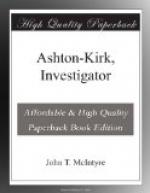“We will not trouble you again, doctor,” Ashton-Kirk assured him. “Thank you, and good-night.”
Once more outside, the man led them along a foot-path that seemed to cut the institution grounds in two. The rays of his lantern danced along the carefully kept lawn; the shadowy trees seemed to move backward and forward, as the thin beams wavered among them.
“The professor lives a good piece away,” the man informed them. “Away over on the county road.”
“Prefers to be alone, eh?”
“I suppose so, sir. And then he has his laboratory and work-shop there, well away from interruption. He don’t like to be much disturbed while he is engaged in his studies.”
“Few of us do,” said Pendleton.
“Quite right, sir.”
They walked along in silence for a time; then they caught a clear humming noise from some distance ahead.
“A motor car,” said Pendleton.
“It’s on the county road,” said the man with the light. “We always hear them when the wind blows from that direction.”
After some fifteen minutes’ steady walking they saw a long twinkling shaft of light coming from among the trees.
“That’s the house,” said Haines. “I hope the professor ain’t busy; you wouldn’t believe what a blowing up he can give a body with his fingers when he’s vexed. I’d almost rather have the doctor himself; though, as a rule, the professor is a very nice gentleman.”
The house was a brick structure of two stories and dimly lighted on the lower floor. Near by was a long, shed-like building, the windows of which were brilliantly lighted.
“He’s at work,” said Haines, in a troubled tone. “And in the shop too! If it was even the laboratory, it wouldn’t be so bad. But he does get so interested in the shop. That machine means more to him, whatever it is, than anything else about the place.”
There came a harsh burring sound from within both the shop and the house. Haines seemed surprised.
“Visitors,” he said. “He seldom has one; and I never knew any to come at night before.”
They saw the figure of Locke cross one of the shed windows toward a door. And just then Ashton-Kirk stumbled rather heavily against Haines; the lantern dropped to the ground and was extinguished.
“I beg your pardon,” said the investigator in a rueful tone; then he began to rub his shins. “That was rather hard, whatever it was.”
The door of the building opened and Locke appeared; his great bald head shone in the light that streamed after him; and it was thrust forward as he strove to penetrate the darkness ahead.
“He feels the vibrations of those buzzers,” Haines told them, “and knows right away when anyone wants to get in.”
He began fumbling with the lantern as Locke disappeared; but Ashton-Kirk said to him:
“You need not light that. We can see very well. And, on second thought, you need not wait, either. We can introduce ourselves to Professor Locke without troubling you further.”




